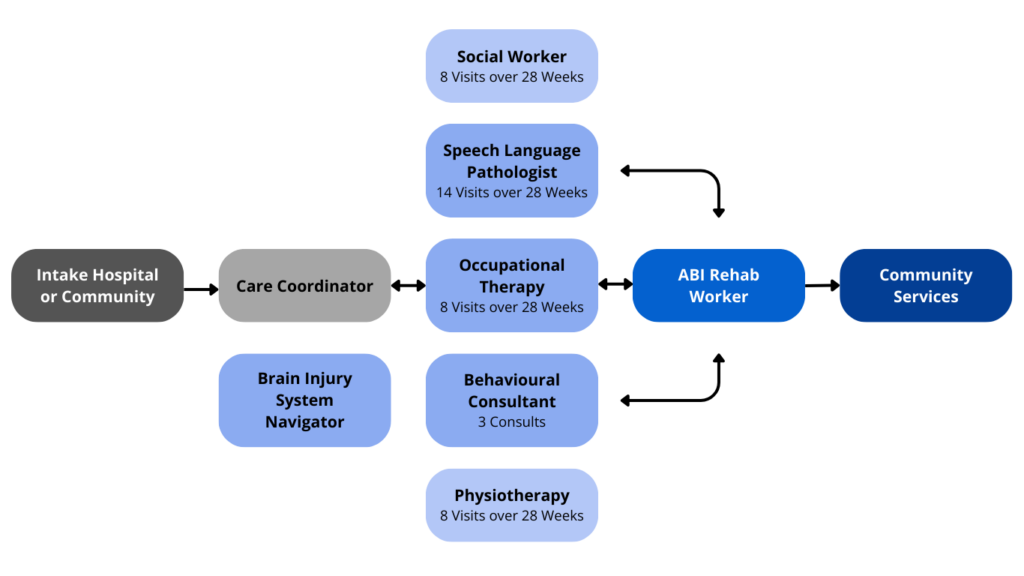Professionals
A collection of resources for healthcare professionals.
Applications can be submitted to the NSM ABI Collaborative.
Applications for Ontario Health atHome need to be submitted through Ontario Health atHome.
ABI Collaborative Services
The North Simcoe Muskoka Acquire Brain Injury Collaborative is a partnership between the publicly funded community acquired brain injury service providers, this includes, Brain Injury Services Muskoka Simcoe, March of Dimes Canada, Ontario Health atHome and York Simcoe Brain Injury Services (a partnership between Makenzie Health Hospital and March of Dimes Canada).
Services offered through the collaborative include:
- Acquire Brain Injury Pathway - Partnership with Ontario Health atHome
- Case Management
- Community Rehabilitation Worker
- Adult Day Services
- Peer Support Groups / Education Groups
ABI Pathway Program
The Goal
- Provide timely provision of rehabilitation services as it has the potential to improve functional status thereby reducing dependency on formal services long term.
- Enhance the functional and social outcomes of individuals with ABI in the community
The Pathway
- Partnership between ABI Community Services – Ontario Health atHome, Brain Injury Services Muskoka Simcoe, York Simcoe Brain Injury Services and March of Dimes Canada
- Template for the coordination of interdisciplinary services
- Provides suggestion as to the number of visits and weeks in service
- Direct offer for referrals coming from intake / hospital / community
- Recognizes that the anticipated pathway of recovery for an ABI survivor is variable
What is the Process?
Please review the flowchart graphic for how the ABI Pathway Program process works.
Rehab Worker involvement is dependent on involvement of OT, SLP and Behaviour consultant. RW supports the client to work on goals identified by the client and the OT, SLP or Behaviour consultant. ABI Navigator remains involved throughout client duration on Pathway to facilitate access, advocate, educate, coordinate ABI services, collect/track data and identify gaps and barriers.
Eligibility for ABI Pathway
- Brain injury occurred within the pas 2 years
- Between the ages of 16 and 65 with a primary diagnosis of acquired brain injury
- Medical conditions are stabilized. No degenerative or deteriorating condition
- Significant impairment of cognition and/or cognitive communication that impacts level of functioning
- Has long term rehabilitation goals related to maximizing independence and community reintegration and there is a reasonable expectation that the patient will benefit from the pathway
- The client has rehabilitation potential
- Willingness to work with the ABI team to maximize independence and provide an environment conducive to treatment
- Does not require 24-hour care from external services to remain in the community
- Does not have on-going issues with substance use which impedes rehabilitation goals
- Does not have untreated mental health issues/concerns that impedes rehabilitation goals
- Has been provided information regarding the services and the time frame and has consented to treatment
Applications for Ontario Health atHome need to be submitted through Ontario Health atHome.
In-patient Rehab Information
To find out more about how to apply and eligibility criteria please follow the link or contact the ABI System Navigator.
Helps hospitals and community-based programs connect people with Acquired Brain Injury (ABI) to the services they need (in-patient and outpatient services).
Search rehabilitative care services provided by members of the GTA Rehab Network with personalized criteria.
Provides specialized care to provincial, regional and local patients and spans the spectrum of service, including: inpatient rehabilitation units, outpatient clinics, community outreach and consultative services.
Best Practice Guidelines
For more information on Ideal care pathways and best practice guidelines please follow the links provide.
Ideal Care Pathways for neurotrauma rehabilitation and provides resources for survivors and families.
Clinical Practice Guideline for the Rehabilitation of Adults with Moderate to Severe TBI, Guideline for Concussion & Prolonged Symptoms for Adults Over 18 Years of Age, and the PedsConcussion Living Guideline for Pediatric Concussion Care.
Hospital to Community Transition Planning for Acquired Brain Injury (ABI): Best Practice Guideline provides interprofessional teams with a clear set of best practices for the four stages of transition planning: Early in the Hospital Admission, During Inpatient Stay, Closer to Discharge, and In the Community.
Education
Brain Injury Canada educational online course library for health care professionals.
The Brain Basics e-Learning course is designed to provide frontline Health Care Workers, Caregivers and others with an opportunity to learn an understandable introduction to the world of Brain Injury.
Six-part Webinar series for behavioural health professionals.
Concussion Navigator
Navigation tool for individuals with concussion, their caregivers, and general health practitioners, to help identify clinics and services that are available based on individualized criteria.

